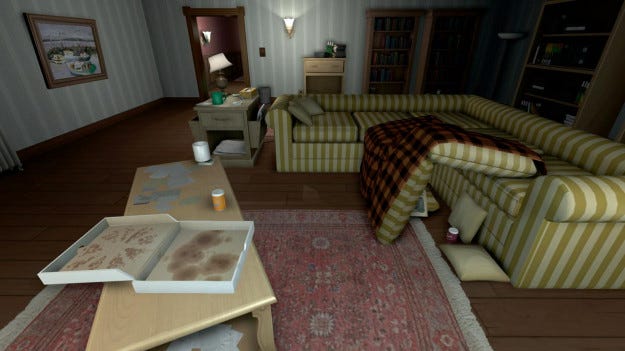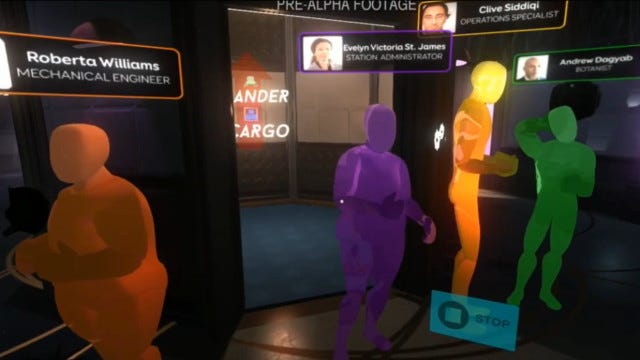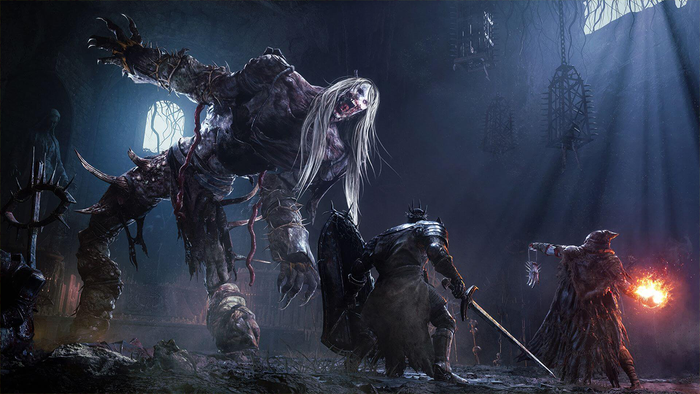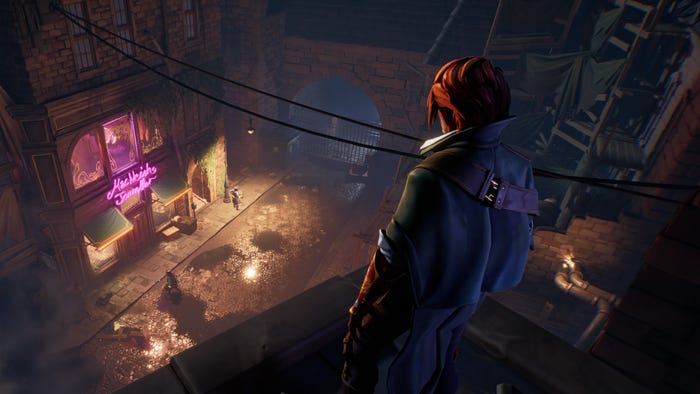We talk to developers from Variable State, Fullbright, Chinese Room, and Campo Santo about the past and future of the walking sim genre. For starters, what do they think of the phrase "walking sim?"

In many games, walking around is just something we do before jumping over that wall or shooting that menacing enemy. But an increasing number of independent games are tamping down on feature-creep and reimagining how we consider putting one step in front of the other.
It’s an intriguing design decision: What if walking around the environment was the primary--or even the only--action to perform? What else needs to happen to the player? Where should you permit the player to go? And why would they want to go there?
Bold titles like Gone Home, Dear Esther, and Firewatch have expanded the scope of what a video game can be by purposefully limiting the scope.
“The key thing for us is the player experience, storytelling, being in the world and the moment,” says Dan Pinchbeck, creative director at The Chinese Room. The studio's first title, Dear Esther, began as a mod of Half-Life 2 that stripped the original game down until all that remained was a mysterious island, a voiceover, and a series of indelible moments. Modern blockbuster open-world games can often feel like a series of checklists to complete. The point of Dear Esther was to exist in this place and wonder what transpired there.
Some skeptics of this burgeoning genre use the term “walking simulators” as a negative. The label - although used for one of the first times in a Gamasutra article defending the game Proteus - has arguably become an ironic push-back to developers who asked players to achieve little more than wandering through a field.
.jpg/?width=646&auto=webp&quality=80&disable=upscale) Dear Esther
Dear Esther
But walking can take you to fabulous places you’ve never been before.
Goals just get in the way of writing good characters, Pinchbeck says, even if those characters are long-gone, as they are in the studio’s Everybody’s Gone to the Rapture. “The story always comes first for us.”
The story of the walking simulator is still being written. Arguably, the phrase has since become the generally accepted name for a genuine genre -- even if some developers don't use or can't stand the term.
When a dismissive descriptor becomes the name of a genre
Karla Zimonja, co-founder of Fullbright and both a 2D artist and story editor on Gone Home, takes the shrugging shoulders approach when asked if the term’s injurious past strikes a sour note. “You don’t get to choose your own nicknames, right?” she says. “People label things in ways they find useful. It’s not really up to us to pick how people refer to our games.”
Triple-A games often have an entire marketing team (and commensurate budget) helping craft a public-facing message about what kind of experience awaits. Indie studios are often stuck doing their own promo, leaving more of that reception to the whims of the players. And at times, their message is the one that sticks. “We tend to refer to our games as ‘story-exploration games,’ Zimonja says, “but, like, it’s not as catchy.”

Gone Home
Jonathan Burroughs, co-founder of Variable State and co-director of their first game, Virginia, agrees that other terms haven’t captured the audience’s attention the way "walking simulator" has. “It’s become this increasingly formal way to group these kinds of games together,” he says. “People sometimes refer to empathy games or alt-games, but I think walking simulator, for better or for worse, seems to be the one that stuck.”
"It’s inherently a reductive description. It’s silly. But it is useful in the sense that if someone describes a game as a walking simulator, it’s immediately of interest to me."
That doesn’t mean he loves the term. “It’s inherently a reductive description,” Burroughs admits. “It’s silly. But it is useful in the sense that if someone describes a game as a walking simulator, it’s immediately of interest to me.”
Pinchbeck concurs. “It’s a stupid term because it doesn’t in any way represent the actual player experience of the games.” In all of these titles, you certainly do more than walk. (Zimonja adds: “I have this nagging feeling that a true walking simulator would be something like QWOP.”)
Some of the acceptance of the term is down to the fact that all genre labels are simplistic, an accepted standard in order to categorize art for consumption’s sake.
“You could argue that calling a game like Deus Ex a first-person shooter is so massively reductive as to become meaningless,” Pinchbeck says. “But the key thing is that players can navigate their way around and find titles they like, so I think it’s better to own it than kick back against it.”
Design choice or happy accident?
"Everyone talks about the first fifteen minutes of Bioshock Infinite. The feeling you get from playing it sticks with you even when you’re not thinking about the part where you’re hitting a splicer in the head with a wrench."
Jake Rodkin of Campo Santo explains that with Firewatch, they didn’t start out wanting to make another "walking simulator."
“We made the game we wanted to make out of pieces of other games, and other genres, that we liked or of ideas we had sitting around in our brains.” That meant taking what a lot of popular titles were doing and focusing on the parts that resonated with them personally. Most of the time, these didn’t match the stated goals on the back of the proverbial box.
“Everyone talks about the first 15 minutes of Bioshock Infinite,” Rodkin says. “Or your memories of your time with Shodan in System Shock, or GLaDOS in Portal... The feeling you get from playing those games sticks with you even when you’re not thinking about the part where you’re hitting a splicer in the head with a wrench or solving a puzzle.”
Zimonja and fellow co-founder of Fullbright Steve Gaynor both worked on Bioshock 2’s lauded DLC, Minerva’s Den. So when they started their own company they had an idea as to what the first-person genre could do. But also which elements they wanted to expand.
“We didn’t go through a period where we experimented with making a shooter and then were like, well, the shooting part is what we can’t afford,” Zimonja says.
She’s quick to point out they weren’t inventing something new so much as building on ideas of the recent past. “We had games like Dear Esther and stuff like that as an example. It’s not like we were stepping completely into unknown territory. So that was a thought process rather than a development process…We wanted to see how much we could strip away and still have a coherent, interesting experience.”
There’s a sense that many walking sims are responses from experienced developers fatigued by working within past constraints. Rodkin and Sean Vanaman started Campo Santo after having worked on The Walking Dead: Season One for Telltale Games.
“That game was very much shot like a television show... But the games we were playing personally at the time were all big first person single player stuff,” Rodkin says.

Firewatch
Firewatch was an attempt to take the dialog-rich, character-heavy narrative of The Walking Dead and plant it within a larger open world. “Can we take this aesthetic and spatial navigation feelings of an immersive sim or something like Day Z,” Rodkin says, “and then take the adventure game, which is a pretty static genre by and large, and then blow it way out by putting an adventure game-style story into a big contiguous world the player can explore at their own pace.”
“Instead of having puzzles, you use a sort of first-person game style environmental storytelling,” Rodkin says. “At the end of the day, maybe that’s what a walking simulator is, I dunno.”
For Burroughs, it wasn’t a previous game he’d worked on but someone else’s. “It was a real epiphanic moment when we played Brendon Chung’s Thirty Flights of Loving for the first time and saw the use of cinematic editing in that game and saw how effective that was.”
He knew Variable State’s first game would hinge on character performance, since co-founder Terry Kenny’s background was in character animation. But Chung’s game showed them a story needn’t be bogged down by spoken words, or even written text, to be compelling.
 Virginia
Virginia
“Rather than a technological innovation, say, it was so much an incredible conceptual leap that he had made,” Burroughs says. “Cinematic editing is the bread and butter of filmmaking. We’re all immersed in it every time we watch a film or TV program. It’s completely familiar to us. And yet completely absent from games.”
Virginia’s story plays out as a series of semi-interactive vignettes. But before you’ve fully explored the room you’re in, the action cuts away and you’re in your police car, or behind an office desk, or in an elevator.
Burroughs describes how programmers have always used these ideas but only behind-the-scenes. “To debug a level, you might teleport a character through to the end of a level to test the scripting of something like that. For twenty years or more, the means of doing what [Chung] did existed.”
It took playing Thirty Flights to realize cinematic editing could be just as pivotal to games as, well, walking around. “We did consider dialog and dialog choices and more traditional ways of blocking progression, the idea of puzzles, or more exploration," he says. "[We] experimented with these things.
"But we kept finding that they felt arbitrary rather than being true to the story. We found the story to be most effective and the game to be most effective, the most rewarding experience, when there weren’t these obstacles...We just pared back and pared back until it was the purest expression of what we were trying to do.”
But is it a game?
"If you say games are all about mechanics, are you saying a game with fewer mechanics is less of a game? Is Space Invaders less of a game because it’s mechanically simpler than Assassin’s Creed?"
Many video games, in fact, could be boiled down to that too-simple phrase. When titles that looked like first-person shooters started taking guns out of players’ hands and asking them to roam freely with few encounters ending in bloodshed, the “walking simulator” was born. Others insinuated such titles weren’t even games.
For Pinchbeck, that’s a bridge too far. “If you say games are all about mechanics, are you saying a game with fewer mechanics is less of a game? And then what do you mean by a mechanic? Because walking forwards is a mechanic, like moving left and right in Space Invaders is a mechanic. Is Space Invaders less of a game because it’s mechanically simpler than Assassin’s Creed?”
No one would point to Space Invaders and cry, “Not a game.” But it has expected elements: a score, enemies to shoot down, obstacles to progress. I played Virginia in one two-hour sitting. There is no score. There is no Game Over screen. Can you die? I don’t even know.
Burroughs understands the argument even if he opposes it. “Games, historically as a term, [are] very much associated with competition and puzzle-solving. And these games are very much not about that.”

Everybody's Gone to the Rapture
“I absolutely don’t think any particular artistic expression is more valid than any other,” he stresses to me. But he wonders if the negative reaction stems from simply not wanting to acknowledge the presence of a broader use for games than escapist adventuring.
"When you do away with mechanics focused on problem-solving and mastery, you’re actually broadening the potential of the emotions they can elicit."
“When you do away with mechanics focused on problem-solving and mastery, you’re actually broadening the potential of the emotions they can elicit,” Burroughs says. “Any game that’s about overcoming challenge, competition, there’s going to be some element of exhilaration, thrill. Doing away with those [mechanics] allows you to have games that are primarily poignant or about evoking nostalgia or whatever.”
For many that come to games with certain expectations, this broader range of potential is no salve. “Perhaps people are just afraid that games might stop being about fun,” Burroughs adds.
Zimonja echoes the sentiment. “It seems like people are worried it’s a Zero-Sum ecosystem,” she says. “If space in people’s minds and on Steam is given to Walking Simulators or what have you then it cannot be given to other games. And that is upsetting to them. They feel like it’s a net loss.”
Then there’s the vague rule-set. Games like Proteus, with its psychedelic landscapes void of threat or obvious endpoint, lacks a goal as clear-cut as jumping on a flagpole or aiming for headshots. “I think it’s hard sometimes for people to get into the mode of being self-directed and mentally engaging with a work,” Zimonja says. “And it’s a pain sometimes. You start reading a book and your mind starts wandering. ‘I’m not up for this.’ And that’s valid. Everybody’s got different entertainment wants and needs.”
Rodkin remembers a similarly caustic reaction to adventure game developers during the late ‘90s, when graphic accelerators and 3D engines were starting to take hold. “I remember adventure game fans on all the popular adventure game boards in the early internet--obviously this is a way smaller community than the Steam community--but I remember people started badging themselves: Adventure Game Purist, No Consoles, No 3D.”

Firewatch
“They were lamenting the fact that... this community I like is getting diluted and is not catering to the things that I want to see,” Rodkin says.
“For me, honestly, back at the time, it could feel a little bit like a betrayal,” he admits. “My attitude now is: If you’re passionate about doing something weird inside of a genre or medium that you like, and you think you have a viable idea, obviously you should be doing that.”
The future
In an industry that grows increasingly competitive with every year, there appears to be a viable market for “doing something weird,” as each developer I interviewed is hard at work on a new project. But for every successful walking simulator, there is also a notable failure. Just don’t expect game developers more interested in narrative and environmental storytelling to start making short films.
“I can’t imagine why I’d want to work in cinema,” Pinchbeck says. “You sacrifice some control, of course. You cannot dictate what the player will be experiencing at any given time, and that creates harder problems to solve [like] ‘how do you retain a really high control over the dramatic sculpting of a moment when you can’t control the framing…’ but for me, those challenges are part of the buzz of making games.”
The team at Fullbright doesn’t see film as a corollary to their work, either. Their upcoming game, Tacoma, is more inspired by the interactive theatre of Punchdrunk, the avant garde company whose “Sleep No More” and “The Drowned Man” have enthralled visitors to New York and London.

Tacoma
“It’s the most video game-y experience I’ve ever had in real life,” Zimonja says. “It’s very strange to have these characters walking around you. They’re almost NPCs. And you can go through drawers and look at documents. It is very much like our videogames.”
The future of games, then, whether simulating walking or drawer-looting, seems to hinge on the same core idea that brings audiences to the theatre or, indeed, a sporting venue: they are a shared experience.
“So much of the way that gaming is experienced right now is with other people around,” Rodkin says, “whether your game is a multiplayer game or a single player game… whether they’re in the world with you or sending items to you or watching you stream the game.”
He describes watching someone play Firewatch on Twitch while others reacted in the chat. “[I’d] watch them mull over choices and watch the audience freak out one way or the other as they’re weighing what to say in the dialogue tree. It was fascinating to watch.”
And that overlap between playing and watching, between different levels of interactivity, seems to perfectly describe the plight of the walking simulator: a game where you are watching more than you are doing, but you’re still invested, still moved to feel an emotion other than joy or terror or triumph.
Burroughs sums up the hopes of developers and players alike who wish to create, and experience, more than just another traditional genre staple, its form cemented over decades of iteration: “I think what excites me most for the future of games are things like Itch.io, where there are marketplaces and ways for people to find audiences so that the craft of making games can be sustainable for people who are making weird stuff.”
About the Author(s)
You May Also Like







